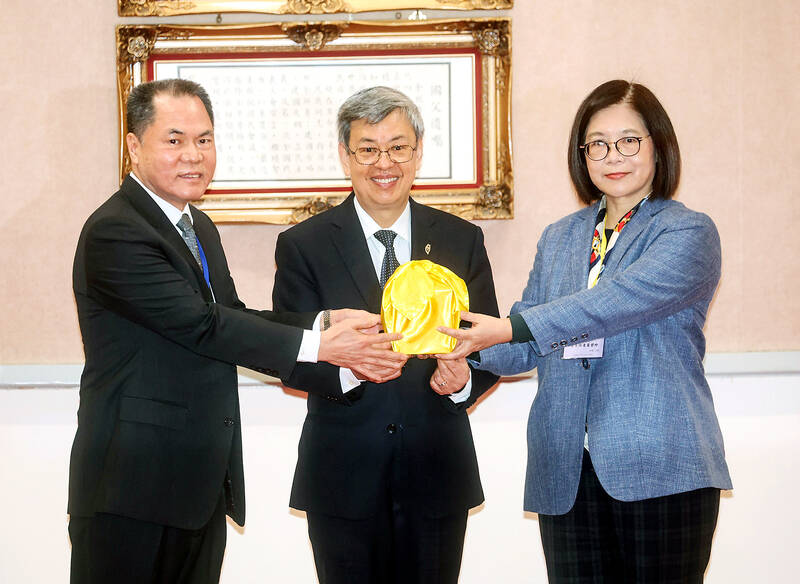The number of female local government heads in Taiwan reached an all-time high of 56.3 percent after the winners took office following last year’s local elections, while the number of women with Cabinet positions increased by nearly 10 percent, the Cabinet said on Wednesday.
The ratio of female mayors and county commissioners increased by 18.8 percentage points with last year’s election results, the Cabinet said in a statement.
Women make up more than one-third of the seats on city and county councils nationwide, while the percentages of female judges and Control Yuan members have both topped 40 percent, it said.

Photo: CNA
The percentage of female legislators reached an all-time high of 42.5 percent in January last year following a by-election that month, it said, citing its Gender at a Glance report, which the Cabinet released on Tuesday.
The number of women in the new Cabinet, which was sworn in the same day, is just under 16 percent, up from 7.3 percent in the previous Cabinet of former premier Su Tseng-chang (蘇貞昌), the report said.
Despite being elected as Taiwan’s first female president in 2016, Tsai Ing-wen (蔡英文) has faced criticism for the number of women who have held top government roles in her seven years in office.
Female leadership has also improved significantly in the private sector, the Cabinet said.
About 586,000 small and medium-sized enterprises were led by women in 2021, an increase of 112,000, or about 20 percent, from 2012, it said.
However, there was a lot of room for improvement at listed and over-the-counter stock market companies, where only 2,738, or 14.9 percent, of directors were female in 2021, it said.
The difference in average income for male and female workers in 2021 was 15.8 percent, with male workers on average paid NT$46,056 per month while female workers received NT$40,030 per month, it said.
The gap increased by 1 percent in 2020, which the report said was because men received bigger raises.
The labor force participation rate for women aged 15 or older was 51.5 percent in 2021 compared with 66.9 percent for men, the report said, adding that 25-29 was the top age group for women, with a participation rate of 89.9 percent.
The 15.4 percentage point difference in labor force participation was an improvement from 16.7 percentage points in 2011, it said.
However, fewer women in Taiwan joined the workforce in 2021 compared with Japan (53.5 percent) and South Korea (53.3 percent), it said.
The report said that 43.1 percent of women who obtained a higher-education degree in 2019 specialized in science, math or statistics, while 18.9 percent worked in construction, manufacturing or engineering, up 0.8 and 0.5 percentage points respectively from 2018.
The report also tracked the number of female researchers in 2020, with the rate rising 1.4 percentage points from 2011 to 22.9 percent.
There were 7,787 reports of sexual assault or harassment against women in 2021, down 1,425 from 2020, while reports of minors facing sexual exploitation on the Internet rose to 1,395 from 1,239 in 2020 and 795 in 2019, the report said.
Using the same metrics as the UN Development Programme’s Gender Inequality Index, which measures gender inequality based on reproductive health, empowerment and the labor market — but does not include Taiwan — the nation’s score would have been 0.036, which would have placed it first in Asia and seventh among 170 countries ranked in terms of efforts to eliminate gender inequality, the Cabinet said.

Alain Robert, known as the "French Spider-Man," praised Alex Honnold as exceptionally well-prepared after the US climber completed a free solo ascent of Taipei 101 yesterday. Robert said Honnold's ascent of the 508m-tall skyscraper in just more than one-and-a-half hours without using safety ropes or equipment was a remarkable achievement. "This is my life," he said in an interview conducted in French, adding that he liked the feeling of being "on the edge of danger." The 63-year-old Frenchman climbed Taipei 101 using ropes in December 2004, taking about four hours to reach the top. On a one-to-10 scale of difficulty, Robert said Taipei 101

Nipah virus infection is to be officially listed as a category 5 notifiable infectious disease in Taiwan in March, while clinical treatment guidelines are being formulated, the Centers for Disease Control (CDC) said yesterday. With Nipah infections being reported in other countries and considering its relatively high fatality rate, the centers on Jan. 16 announced that it would be listed as a notifiable infectious disease to bolster the nation’s systematic early warning system and increase public awareness, the CDC said. Bangladesh reported four fatal cases last year in separate districts, with three linked to raw date palm sap consumption, CDC Epidemic Intelligence

US climber Alex Honnold left Taiwan this morning a day after completing a free-solo ascent of Taipei 101, a feat that drew cheers from onlookers and gained widespread international attention. Honnold yesterday scaled the 101-story skyscraper without a rope or safety harness. The climb — the highest urban free-solo ascent ever attempted — took just more than 90 minutes and was streamed live on Netflix. It was covered by major international news outlets including CNN, the New York Times, the Guardian and the Wall Street Journal. As Honnold prepared to leave Taiwan today, he attracted a crowd when he and his wife, Sanni,

Taiwanese and US defense groups are collaborating to introduce deployable, semi-autonomous manufacturing systems for drones and components in a boost to the nation’s supply chain resilience. Taiwan’s G-Tech Optroelectronics Corp subsidiary GTOC and the US’ Aerkomm Inc on Friday announced an agreement with fellow US-based Firestorm Lab to adopt the latter’s xCell, a technology featuring 3D printers fitted in 6.1m container units. The systems enable aerial platforms and parts to be produced in high volumes from dispersed nodes capable of rapid redeployment, to minimize the risk of enemy strikes and to meet field requirements, they said. Firestorm chief technology officer Ian Muceus said